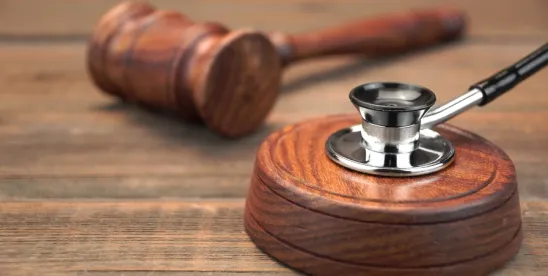In February, a panel of three judges in the U.S. Court of Appeals for the First Circuit issued a decision in United States v. Regeneron Pharmaceuticals, Inc. ruling that “but-for” causation is the proper standard for False Claims Act (FCA) cases alleging improper kickbacks and referrals in violation of a 2010 amendment to the Anti-Kickback Statute (AKS). This decision deepens a circuit split on the issue, as the Sixth Circuit and Eighth Circuit have adopted a but-for causation standard, while the Third Circuit ruled that the kickback only needs to be a contributing factor.
The circuit split is likely to be resolved by the Supreme Court, but in the meantime, its impact on FCA enforcement poses complications for whistleblowers looking to report kickbacks under the FCA’s qui tam provisions.
However, the First Circuit panel in Regeneron also clarified that there still exists a key route for whistleblowers and the government to pursue AKS-based FCA cases under the implied false certification theory. The court held that there still remains FCA liability when compliance with the AKS is a recognized precondition of payment under a federal healthcare program and a provider falsely certifies compliance with those requirements to get a claim paid by Medicare or Medicaid. Notably, the court held that there is no but for causation required when such an implied false certification claim is pursued under the FCA.
The Anti-Kickback Statute, False Claims Act and Whistleblowers
Dating back to the Civil War, the False Claims Act targets fraud among government contractors. It holds that any person who knowingly submits, or causes to submit, false claims to the government is liable for three times the government’s damages plus a penalty.
A key element of the FCA is its qui tam provisions, which empower whistleblowers with knowledge of FCA violations to come forward and file lawsuits on behalf of the government, which then has the option to intervene and take over the lawsuit. Regardless of whether the government intervenes, whistleblowers whose qui tam suits result in successful cases are eligible to receive between 15-30% of the funds collected in the case.
The Anti-Kickback Statute prohibits the exchange (or the offer to exchange) of any form of remuneration to induce or reward referrals for services or items reimbursable by federal healthcare programs. In violating the AKS, a company or individual can also be liable under the FCA. While the AKS imposes criminal liability on violations, the FCA adds civil liability.
Over the years, the government and whistleblowers have aggressively enforced violations of the AKS and FCA in tandem. For example, in July 2024, the Department of Justice announced that DaVita Inc., a healthcare company providing kidney dialysis services, agreed to pay $34 million to settle allegations that it violated the FCA through the illegal payments of kickbacks to induce referrals to DaVita’s dialysis centers and DaVita Rx, a former subsidiary that provided pharmacy services for dialysis patients. The settlement resolved a qui tam whistleblower suit filed by Dennis Kogod, a former Chief Operating Officer of DaVita Kidney Care, who received a $6,370,000 whistleblower award from the settlement proceeds. Over the years, many of the largest False Claims Act whistleblower recoveries have been based on alleged AKS violations in the health care industry.
First Circuit Ruling and Circuit Split
The First Circuit’s ruling in Regeneron centered around a provision in the 2010 amendments to the AKS which states that “a claim that includes items or services resulting from a violation of [the AKS] constitutes a false or fraudulent claim for purposes of [the FCA].” (Emphasis added)
In Regeneron, the government alleged that drug manufacturer Regeneron Pharmaceuticals paid tens of millions of dollars in kickbacks for its macular degeneration drug Eylea by using a foundation as a conduit to cover Medicare co-pays for Eylea.
The issue before the First Circuit in Regeneron was the level of causation required to satisfy the “resulting from” language. The First Circuit ruled that that “but-for” causation is the proper standard, meaning that there is no FCA liability if the claim would have been submitted regardless of the illegal kickback.
In Regeneron therefore, the Court ruled that Regeneron Pharma was not liable under the FCA because the government could not prove that doctors prescribing Eylea would not have done so “but for” the alleged kickbacks covering the co-pay cost.
According to the First Circuit, “The Supreme Court has held that a phrase like ‘resulting from’ ‘imposes… a requirement of actual causality,’” and “Accordingly, ‘it is one of the traditional background principles ‘against which Congress legislate[s]’ that a phrase such as ‘result[ing] from’ imposes a requirement of but-for causation.” While the Court notes that textual or contextual indications may suggest a different standard of causation, it ruled that none were present in the 2010 AKS amendment.
The First Circuit ruling deepens a circuit split on the issue. The Sixth and Eighth Circuits had also previously adopted the more stringent “but-for” causation standard for AKS-based FCA claims. The Third Circuit on the other hand has rejected the “but-for” causation standard and instead adopted a broader standard allowing for FCA liability if the kickback was merely a contributing factor to the submission of the claim.
Implications and Routes Forward for Whistleblowers
The circuit split on the causation standard for AKS-based FCA claims poses some complications for whistleblowers looking to hold fraudsters accountable through qui tam lawsuits. Firstly, the split will cause confusion about what standard applies for which justifications. But even more importantly, the “but-for” causation standard will make it much harder for whistleblowers and the government to prove False Claims Act liability in kickback cases.
There still remains a key route for whistleblowers and the government to pursue AKS-based FCA cases: the false certification theory. Under the false certification theory, a violation of the AKS can give rise to FCA liability when compliance with the AKS is a recognized precondition of payment under a federal healthcare program and a provider falsely certifies compliance with the law when it submits a claim, or causes the submission of a false claim.
The false certification theory predates the 2010 amendments at issue and is considered a distinct pathway towards proving FCA liability. In Regeneron, the First Circuit clearly states that “claims under the 2010 amendment run on a separate track than do claims under a false-certification theory” and that “there is nothing in the 2010 amendment that requires proof of but-for causation in a false certification FCA case.”
Barring a Supreme Court decision striking down “but-for” causation or a Congressional amendment clarifying a different standard of causation, FCA whistleblower claims can still survive if they can file qui tam suits based upon the false certification theory. Additionally, many whistleblower qui tam FCA cases alleging illegal kickbacks and violations of the AKS can meet the but for causation test. Consequently, whistleblowers and their counsel will need to evaluate the possible routes available when there are allegations of illegal kickbacks being paid in the context of providing health care that is reimbursed by Medicare, Medicaid or other government healthcare programs.
The government has made AKS enforcement a major FCA priority in recent years and the Deputy Assistant Attorney General Michael Granston recently promised that under the Trump administration the Department of Justice “plans to continue to aggressively enforce the False Claims Act.”
Individuals looking to blow the whistle on illegal kickbacks should contact an experienced False Claims Act whistleblower attorney.
Geoff Schweller also contributed to this article.





 />i
/>i

